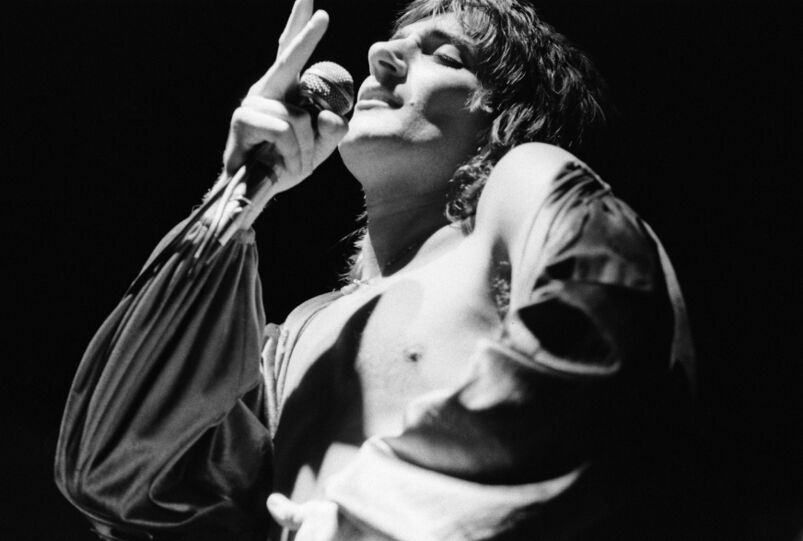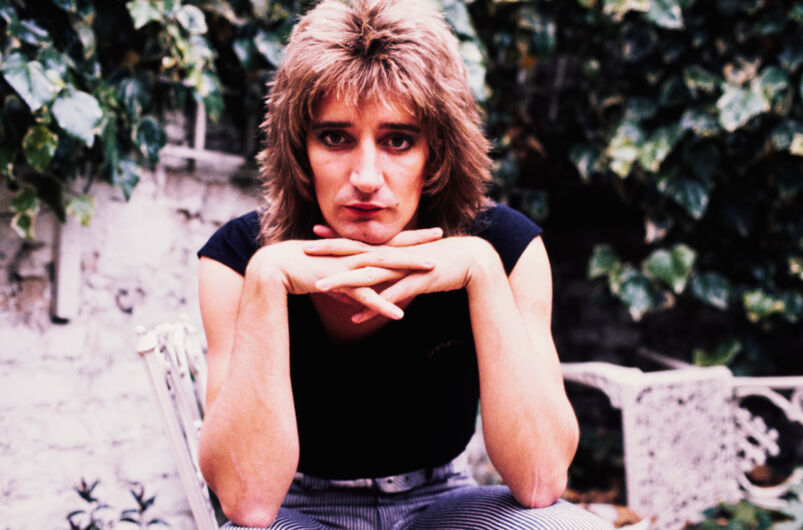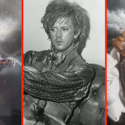
1976 was a pivotal moment in Rod Stewart’s career. He had already found success as a member of the Jeff Beck Group and then again with The Faces, but both had broken up by that year. So the legendary crooner launched a solo career. But now he had nothing else to fall back on if it didn’t work out.
That context is helpful when explaining what made his single “The Killing Of Georgie (Part I and II)” such a risk, and therefore, a song that deserves to be applauded and remembered in gay history.
“The Killing Of Georgie (Part I and II)” served as the second of two singles from Stewart’s seventh album A Night On The Town. The full-length is still remembered as not only one of his best, but one of his most controversial—and one of his biggest hits from the record is partially to blame for that reputation.
The track tells the story of a man named Georgie. Very quickly into the tune, it becomes clear that Stewart (who acts as a narrator of sorts) loves this man, though not romantically. He refers to him as “The kindest guy I ever knew,” which is noteworthy, as just lines before, the singer calls him “gay, I guess.”
Stewart shows how he feels about this—and same-sex relationships in general—with the lyrics, “The afternoon George tried to explain / That he needed love like all the rest.”
To Stewart, being gay wasn’t an abomination or something to be ashamed of. It was just love, though he was keenly aware that not everyone saw things the way he did. Anyway, Georgie comes out to his parents, who are distraught, and they kick him out of their home.
The newly-out man moves to New York City where he finds a home and a community. He makes friends, cruises (an action mentioned specifically, which also must have caught the attention of some more conservative listeners), and goes to see theater, even taking in a Broadway opening night. This would have been a story that many young gay men in the mid-’70s would have connected with.
One evening, Georgie leaves a musical before the curtain goes down, and on his way home, he’s attacked by thieves. They stab him, killing the young man. Though Stewart doesn’t specifically state that this was a crime motivated by hate, the listener can insinuate that his sexuality may have played some role. Again, many gay men listening to the single when it was released may have related with this part of the tune as well, unfortunately.
“The Killing Of Georgie (Part I and II)” was an extremely unlikely single, as it dealt with homosexuality and violence, and yet… it worked. The tune went right to the top 10 in a number of countries, peaking at No. 2 in Stewart’s home nation of the U.K. and breaking into the top 40 on the Hot 100 in America.

What makes the entire affair even sadder is that it’s a true story.
Stewart talked openly about the inspiration behind the track for years afterward, saying that “Georgie” was a man he knew from his time with The Faces. He admitted that he wasn’t sure if the friend was stabbed or shot in real life, and also that he may have fudged some details for the sake of the song, but ultimately, this is a love letter to a gay man who was taken far too early.
“The Killing Of Georgie (Part I and II)” comes in two parts, as the title suggests. The first half was really the hit, in spite of its subject matter, but the second half is even more emotional. As the lengthy cut progresses, the singer shares that though he’s gone, Georgie’s lessons about living life to the fullest have been heard and heeded. By the end, Stewart is just plain sad, begging for his friend not to go, but, alas, it’s in vain.
Few male musicians—or any artists, for that matter—would have bet their careers on a song about a gay man, especially in the 1970s. It was a real gamble, and thankfully, it paid off beautifully. “The Killing Of Georgie (Part I and II)” is a touching tribute to a dearly departed friend, and it includes some fairly radical lines about acceptance while also forcing the public to consider the violence that the LGBTQ+ community faced at that time (and to this day).
Related:
10 very gay love songs written by straight guys
Call it a gay-straight musical alliance




















dbmcvey
This is a groundbreaking and tragic song that I hope we never have to say how relevant it still is in the future.
PolishBear
And the right wing responded by promoting rumors that Rod Stewart was Gay.
Jim
What a song, but notice Rod, his looks and movements. He says as much, maybe more, with those than he does with the lyrics.
Lesser talents need big production numbers
bachy
A simple, heartfelt song about the loss of a beloved friend – something most people can relate to.
Prowelsh56
For those of us who remember this song from 1976’s Stewart ” styled” this song to prefection. He didnt over do anything in pose or body language which drew you to the words of the song…and not all the fab blush of today. Simple. Very eloquent..and some of us from the UK so lucky to have heard this live. A masterpiece.
SDR94103
I saw Rod sing this song at the Cow Palace in San Francisco in 1976. So many of us cried.
Squeak
Extraordinary humanity without drama, in a musical poem
stanhope
It was his finest moment…..I once saw him while lunching at Astor Court in the St Regis and it occurred to me go go over and say how important that song was but i thought better of it thinking he was entitled to his privacy.
DennisMpls
I’m a massive Rod Stewart fan, and own several albums. Side one of “A Night On the Town” is a fantastic collection of songs, ending with “The Killing Of Georgie.” My favorite song on the album was actually “Tonight’s The Night,” which is both very sexy and also romantic. I always listened to it from a gay perspective, though I never was able to make the ultimate connection with the object of my listening reveries. Sigh….Now the song instantly brings back all of those feelings.